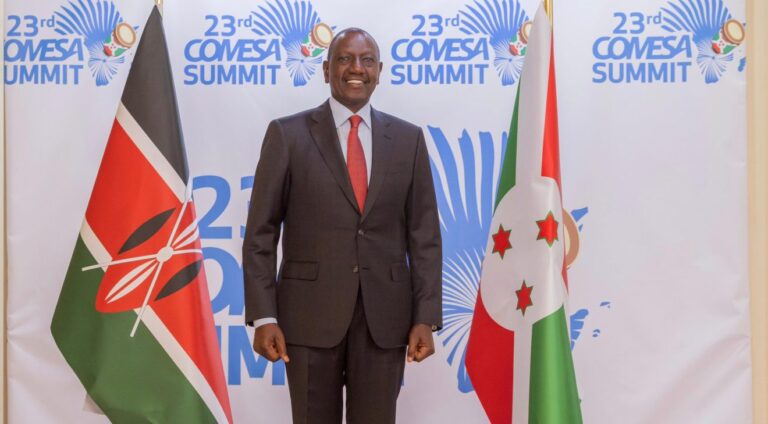
President William Ruto addressing mourners on Saturday, April 12, during the funeral service of Raila Odinga’s long-serving aide George Oduor at Ramba High School in Siaya County. Photo/PCS
By Newsflash Reporter
President William Ruto has downplayed the growing “Ruto Must Go” chants that have increasingly featured in political rallies and public protests, terming them a familiar refrain in Kenyan politics.
Speaking on Saturday, April 12, during the funeral service of Raila Odinga’s long-serving aide George Oduor at Ramba High School in Siaya County, Ruto told mourners that such calls were nothing new and should not cause alarm.
“Criticism is normal. Now you are saying ‘Ruto Must Go.’ I have heard that several times,” the President said, in reference to chants that have gained popularity among opposition supporters and sections of the public disillusioned with his administration. “There was ‘Moi Must Go,’ and other subsequent leaders were also told they must go. ‘Must Go’ is just a normal song. There is no problem about it.”
Read more: Military, NIS warn against ‘Ruto Must Go’ campaign
His comments come at a time when frustration is mounting among Kenyans over the rising cost of living, high taxation, and perceptions of government inaction on key socio-economic issues. The opposition, led by Raila Odinga, has capitalized on the public discontent, organizing forums and rallies where the slogan has become a rallying cry.
Ruto, however, maintained a composed tone, insisting that political criticism is part of democratic expression. He said he would not be distracted by nicknames or chants meant to taunt his administration.
“So, there is no problem,” Ruto added. “They have been calling me Kasongo or Zakayo. I am not bothered because I am focused. We must get our education right, and we must handle devolution in the right way.”
Focus on governance and national unity
Ruto used the opportunity to reaffirm his commitment to strengthening critical sectors of governance, particularly education and devolution.
Without directly responding to opposition attacks, Ruto emphasized that his administration was focused on delivering services and ensuring that counties function effectively under the devolved system of government.
“We are determined to ensure every child has access to quality education and that devolution works for all Kenyans,” he said.
His presence in Siaya—an opposition stronghold and the political backyard of Raila Odinga—was seen as a calculated move to project national unity and reach across political divides. Attending the burial of George Oduor, who had worked closely with Odinga for decades, Ruto struck a conciliatory tone, acknowledging Oduor’s service and the need to rise above partisan politics in moments of national reflection.
Read more: Why military, NIS have gagged ‘Ruto Must Go’ campaigns
The event drew a host of leaders from across the political spectrum, with some interpreting the President’s attendance as a show of statesmanship amid growing tensions. Political observers note that Ruto’s rhetoric suggests a deliberate effort to tone down hostilities while continuing to push forward with his development agenda.
As the “Ruto Must Go” slogan continues to reverberate in political discourse, the President appears intent on portraying himself as unshaken, embracing criticism as part of Kenya’s evolving democratic culture.



